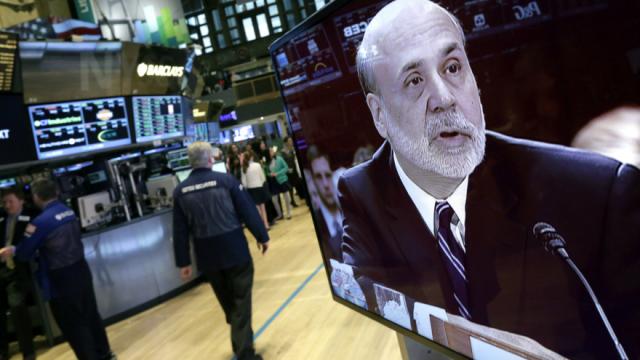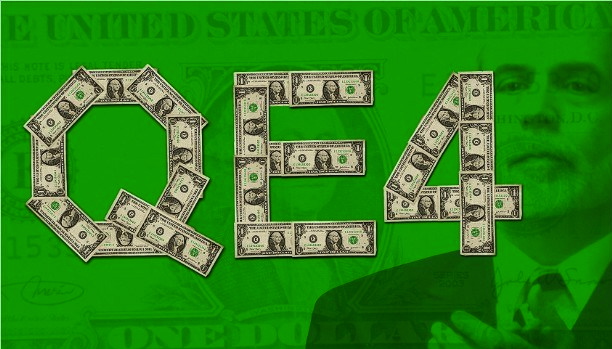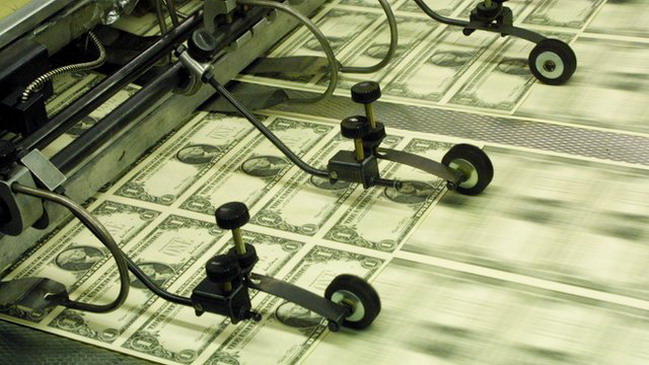
When I heard that Federal Reserve Chairman Ben Bernanke told Congress last week that it was too soon for the Fed to end its extraordinary stimulus programs, I did a double take.
"What stimulus programs?" I thought. Where are the jobs programs? Where are the "extraordinary" social services that will enable those still suffering from the effects of the Great Recession to buy more and stimulate the economy?
What escaped my attention for a moment was the fact that these words were uttered by an official steeped in the jargon of high finance and political policy — where words like "stimulus" are treated to Orwellian twists, their meaning transformed into something very different from what most people understand them to mean.
Bernanke's "Stimulus"
What Bernanke meant by "stimulus" was not programs that economically strengthen the 99%. He was referring to policies that keep interest rates low, including what is known as Quantitative Easing (QE).
QE is the Fed's practice of printing money out of nothing in order to purchase mortgage-backed securities. When the program started, the monthly amount printed was $40 billion. As incredible as this amount sounds — especially while the government plans to cut needed public programs such as Social Security and Medicare to "balance the budget" — today that amount has more than doubled to $85 billion printed a month.
Combined with these measures, the Federal Reserve is keeping interest rates ultra-low in order to encourage businesses to borrow money and expand their operations. The Fed's alleged desired outcome is to encourage banks to make more loans to the private sector, thereby encouraging economic growth and job creation.
To reach this goal, however, these policies have to be set out on the right path. Currently, they are not.
On the contrary, today's policies are guided by supply side, trickle down theories which essentially claim that the problem with the economy is that the rich aren't rich enough. If the economy is still weak, it is because not enough money has been thrown at the 1% and, therefore, more must be made available for their benefit.
A crucial detail missing in this scheme is that the wealthy already have more than enough money. Banks have $1.5 trillion in reserves, and companies have $2 trillion stashed away. They are not investing in job creating ventures because consumers don't have the money to buy their products, and there is no profit to be made from commodities that sit on the shelf.
Consequently, Bernanke's policies are, at best, as effective as pouring water on an over-saturated sponge and expecting it to get absorbed.
What have been the results of Bernanke's "stimulus"? There has been a weak upturn in job creation, falling far short of what is needed to return to the employment rate prior to the crash of 2008. In addition, the stimulus has been too weak to counter the accumulating impacts, including layoffs, of sequestration as it starts to gather steam. What's more, it is a very dubious proposition that this slight and temporary job upturn has anything to do with Bernanke's extraordinary measures at all.
Considering the trillions of dollars that have been printed by the Fed so far, these outcomes do more to discredit QE than encourage its continuation — that is, unless you are a member of the big business elite whom Bernanke aims to please above all. The Stock Market has been climbing since these programs were started.
By re-inflating the Stock Market, the Fed has created a recovery for those few at the top of the economy while everyone else continues to suffer from the effects of the Great Recession. This is because the top 5 percent owns 60 percent of the nation’s individually held financial assets, 82 percent of individually held stocks, and more than 90 percent of individually held bonds. These are the financial tools whose prices are driven up by the Fed’s "stimulus."
Quantitative Easing is a primary driver of income inequality. It is, in the words of Reason Foundation economist Anthony Randazzo, "...fundamentally a regressive redistribution program" where wealth stays at the top rather than trickling down to the rest of the economy.
It is no wonder, consequently, that the Dow spiked 125 points minutes after Bernanke announced his intention to continue QE. The Fed's stimulus policies amount to one of the most expensive forms of corporate welfare in history.
Answers?
The truth is the corporate political leadership of this country has no credible answers for reversing the economic crisis, because they continue to sustain their backers' power and the profits that created this mess. Their logic: better to continue to fatten their pockets at the expense of all than to pursue policies which address the nation's fundamental economic problems and demand that the rich and corporations pay their fair share.
Because QE prints money out of nothing, it encourages both inflation and the creation of massive bubbles in the economy similar to those that led to the current economic crisis. For Bernanke and his supporters, the risks posed by these policies are necessary dangers that must be faced to satisfy the appetites of Wall Street and big business. "Stimulus" for these dominating special interests has, in practice, meant continued high unemployment, declining wages and worker rights, as well as greater economic instability in the future for everyone else.
There are measures that can be taken to begin to reverse the course of America's broken economy. A massive federal jobs program to create full employment and raise wages is the stimulus that is needed, and the money is out there to do it. Currently deductions, credits and other tax breaks flow disproportionately to the highest income Americans. If we closed these, there would be nearly $1.1 trillion of revenue available.
In addition, not just corporate but bank tax rates should be sharply increased to pay for the economic mess that those financial institutions created. Putting those funds towards job creation, education and establishing universal healthcare would lift up the well-being and standard of living for all working class communities.
Putting such measures at center stage of the political dialogue requires more than good arguments. Fixing an economy is not like repairing a car engine where the problem can be diagnosed and quickly gotten to work on. It involves a contest of power between competing interests, that is, a struggle between the forces aligned with Labor and those allied with the corporations and banks.
We need real stimulus, not the insane schemes of the Fed. To get what we need, unity must be forged in the streets, building a social force independent of both major parties that will not compromise our needs to the interests of Wall Street.
Mark Vorpahl is a union steward, social justice activist and a writer for Workers Action and Occupy.com. He can be reached at Portland@workerscompass.org.
3 WAYS TO SHOW YOUR SUPPORT
- Log in to post comments















